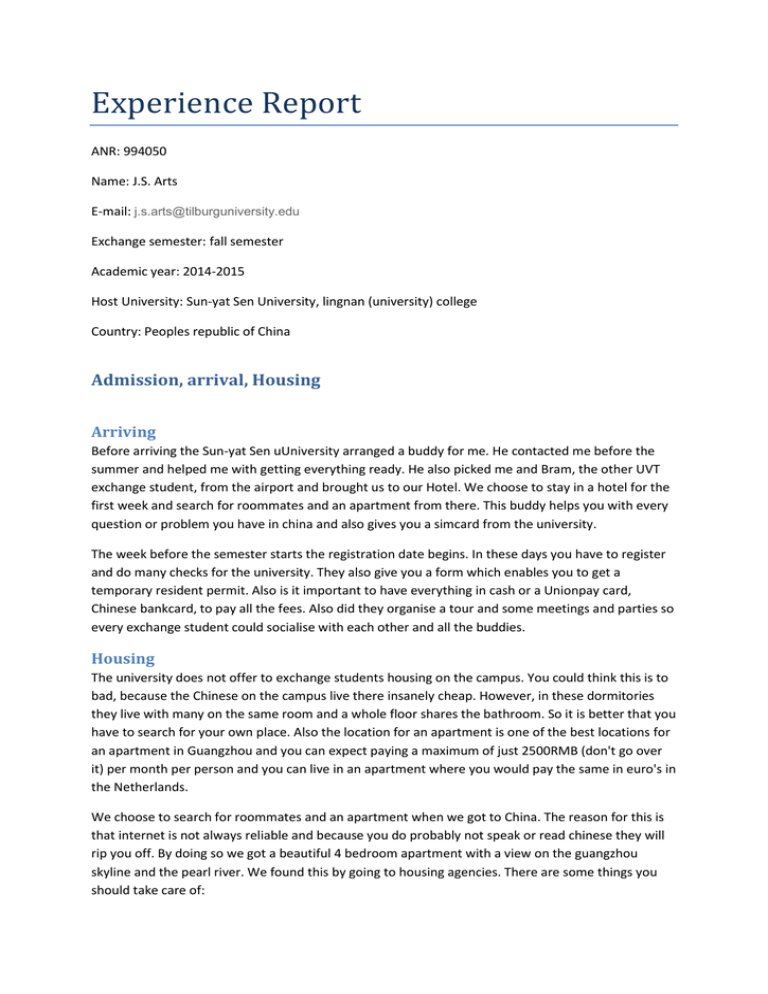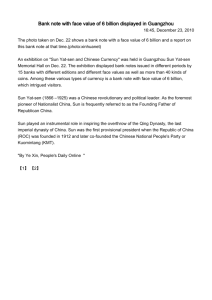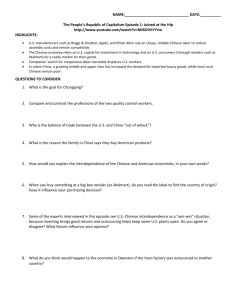Experience Report
advertisement

Experience Report ANR: 994050 Name: J.S. Arts E-mail: j.s.arts@tilburguniversity.edu Exchange semester: fall semester Academic year: 2014-2015 Host University: Sun-yat Sen University, lingnan (university) college Country: Peoples republic of China Admission, arrival, Housing Arriving Before arriving the Sun-yat Sen uUniversity arranged a buddy for me. He contacted me before the summer and helped me with getting everything ready. He also picked me and Bram, the other UVT exchange student, from the airport and brought us to our Hotel. We choose to stay in a hotel for the first week and search for roommates and an apartment from there. This buddy helps you with every question or problem you have in china and also gives you a simcard from the university. The week before the semester starts the registration date begins. In these days you have to register and do many checks for the university. They also give you a form which enables you to get a temporary resident permit. Also is it important to have everything in cash or a Unionpay card, Chinese bankcard, to pay all the fees. Also did they organise a tour and some meetings and parties so every exchange student could socialise with each other and all the buddies. Housing The university does not offer to exchange students housing on the campus. You could think this is to bad, because the Chinese on the campus live there insanely cheap. However, in these dormitories they live with many on the same room and a whole floor shares the bathroom. So it is better that you have to search for your own place. Also the location for an apartment is one of the best locations for an apartment in Guangzhou and you can expect paying a maximum of just 2500RMB (don't go over it) per month per person and you can live in an apartment where you would pay the same in euro's in the Netherlands. We choose to search for roommates and an apartment when we got to China. The reason for this is that internet is not always reliable and because you do probably not speak or read chinese they will rip you off. By doing so we got a beautiful 4 bedroom apartment with a view on the guangzhou skyline and the pearl river. We found this by going to housing agencies. There are some things you should take care of: get aircondition immediately in every bedroom and try to get a heater. There is standard no heater in an apartment in Guangzhou. Temperatures do not go below 0 Celsius. Gas, water, electricity and internet is not included in rent price You also have to pay a management fee for the security and cleaning of the complex where you live. Location of university/city the university is located in the Haizhu district in Guangzhou. In this district and not to far from the university is the Canton tower and Canton Fair Halls. In Haizhu are small chinese restaurants and are some bars. However, for nice western food and clubs you need to take a cab to the otherside of the river. In the city you can find many clubs, bars, shopingmalls, small shops, cinema's and restaurants. Everything is reachable by metro, cab or boat, very cheap. It is always crowded in this city since there are 12.000.000 people living here. Distances on maps look smaller here then they really are, like in Tilburg. Small roads are not always mentioned on the maps and big roads look small. Guangzhou is located in the south of China, and lies at the end of the Pearl River delta. Just one hour from the city you can find Hong Kong and Macau and also Shenzen is therefore close. Travelling to other places in Asia is easy since Guangzhou Airport is a major hub in the world especially served by China Southern. Academics At Sun-yat sen University many subjects are worth only 4ects and some are 6ECTS. This is because these 4ECTS courses start later compared to Tilburg but end around the same time. I took one more course than necessary because that one came available later in the semester due to a shift of the timeschedule. I took in total 8 courses but I do not feel that I had to work that much more than in Tilburg. This is because the level of English is poorer than of people attending and teaching at Tilburg University and they adjusted the speed the course is teached according to it. You do have to attend almost every class in China. My course list: Human Resource Management, this teaches you about Human resource management and is easy to take. The teacher explains what he wants and you only have to do a couple of openbook exams and assignments. Green Operations: This course introduces you into the field of green operating and shows different green initiative. For this course you have to present and do some assignments Creative Thinking: This course focuses on getting you to explore your creative mind and teaches you how to manage and sparkle creativity with others. Case studies in Corporate Finance: this course is really tough and expects of you that you have plenty of knowledge already in Finance. It is an advanced Finance course. You have to make a couple of assignments based around Chinese firms and in the end there is an exam. This course is also really intensive since it only last one month. One good thing is that the teacher is from England and speaks excellent English. Marketing in Mainland China: This courses teaches you, how marketing works in China, which differs sometimes from Europe. It is given by a teacher who speaks excellent English and to pass it you have to do some team assignments and a test. China Business Study: This subject teaches you about everything economic or business related to China. Every lecture is given by another teacher. For this course you have to hand in 4 notes & comments and a big assignment in the end Governance and Development in China: This subject teaches about the political field in China. This subject is given only to Exchange students and discusses and explains some of the Chinese policies. Chinese Language: This course just teaches you your first words of Chinese and especially teaches you how to respond to the situations you will encounter during your exchange. To pass you need to present and make a test. Social life The university does not organise many events especially for exchange students. The Chinese students are when you get to meet them more closely most of the time very open. However, there are some students who do not want to talk with you because they do not want to talk English. We had with all the bachelor exchange students a tight group and also our Chinese friends sometimes joined us in activities. The activities were the same as in Tilburg and mainly were cinema, partying and eating. We only used 2 times our kitchen to make dinner. At a Chinese restaurant it is just as cheap. Travelling is really easy when you have a resident permit, without this you cannot travel outside China. You can go to Hongkong, Macau and many other places in the world really easy and many visa you can get at the local consulate of the country within the city. Living Costs When I was there I could only get the regular Dutch student grant. Tilburg University does not give any grand for this university and you have to find them yourself. I do know there was a Chinese Student grant you can apply to but you have to apply way before you know to which university you can go. The costs in China are the same for me as in Tilburg. you should not pay more than €400 for an apartment per person. You can survive on food for just RMB100 (around €15) a week, however if you go eating at western restaurants you pay Dutch prices or less. Also getting a taxi is can be cheap if you drive on the meter and make sure they are not fooling you. The only place where you can expect to pay more than in the Netherlands is at Clubs, but here the Chinese like to give you drinks and you can save in this way money since they pay. Books are extremely cheap, if you even need them, since you can get them at the print shop where they just print your book and you pay RMB10 (+- €1,50) Culture Cultural differences between China are comprehensive. Chinese culture is drastically different with the Dutch culture. However, in the big cities, like Guangzhou, you can find more western influences and will it feel more like the Netherlands. However, if you did not grow up in Asia the cultural differences will be big and you will experience a culture shock. China is a big independent communistic country and they have sometimes a different view on topics than people in Europe have. I think I learned a lot during this exchange, also about china. One of the most valuable lessons is that you can also look things from a different perspective instead of the common western view. I would call Guangzhou a more Chinese city than Shanghai and Beijing. From Guangzhou you can easily travel inside and outside China with your resident permit and foreign passport. Personal Development My own development in China is that I opened up my point of view. I learned there are multiple different ways to look at a problem. I also learned how to survive and adapt in a different culture. I created many new Chinese friends and also learned what I really do not like. Tips for future students I would recommend for students not that much but to be open and just experience. One important thing where no one could give me any answer on is travelling outside of China. To be able to do so you need to do the following things. When You arrive in Guangzhou and you registered yourself for the semester at the university, you go to the visa center and change your X2 single entry visa into a temporary resident permit. After you get this you can travel to hongkong and every other place. When you only have a X2 visa you can not leave the country or you have to apply for a new one. Picture: Some of the exchange students and our Chinese friends






